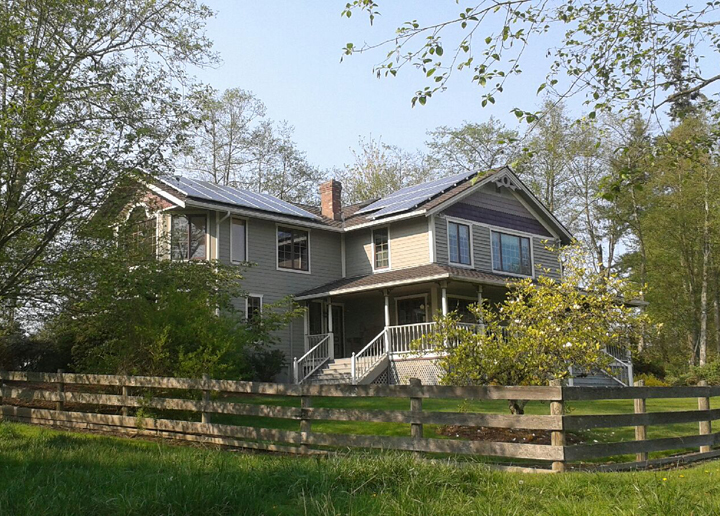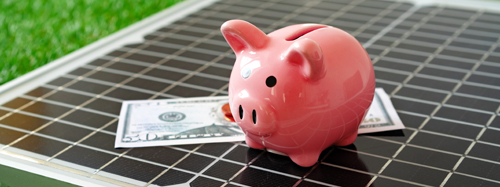Incentives for Solar
Solar Power Incentives
The following information focuses on solar incentives for Washington State residents. For incentives available in other states, please visit the Database of State Incentives for Renewables & Efficiency, DSIRE.
Federal Tax Credit of 30%
Note: The information provided here was gathered from publicly available sources generally accepted as reliable. However, we recommend that you contact the IRS, your tax preparer or your financial advisor for professional financial guidance.
You earn 30% of the total project cost back as a Federal Tax Credit when you have for solar electric (PV) installed from 2022 through 2032. For systems installed in 2033 the solar income tax credit is 26%, then lowers to 22% in 2034. In 2035 and beyond, the residential solar tax credit expires, and the business solar tax credit drops to 10%. This incentive requires that you owe enough in federal income tax that you can take a tax credit.
How do I know if I am eligible to receive the federal solar tax credit?
 Date of installation:
Date of installation:- For residential systems you can claim the residential clean energy credit in the year the system went into service on your home. It does not matter when you paid for the system.
- For non-residential systems the investment tax credit will use the construction commencement date.
- Location: Your solar electric or energy storage system must be installed on your primary or secondary residence in the United States. Rental properties and commercial properties that are not owner occupied do not qualify for the residential clean energy credit but are eligible for the business investment tax credit.
- Ownership: You must own the solar electric or energy storage system, meaning you purchased it outright or financed it with a loan. You cannot take the tax credit if you lease a solar system.
- Original Installation: Your solar electric or energy storage system must be new or being used for the first time. The credit can only be claimed on the original installation of the equipment – if you bought a house that came with a solar system already installed, you are not eligible for the credit.
How to claim your residential solar tax credit
Residential taxpayers can apply a credit to their federal income tax bill at the end of the year in which their system went into service based on the total price of the system. If you can’t use the full amount in one year,the solar tax credit can be carried forward to future years. But it’s still unclear how many years you can carry your tax credit forward.
- File IRS Form 5695 as part of your tax return
- In Part I, calculate the credit of the tax form
- File your solar system as “qualified solar electric property costs”
- On line 1, enter your project’s total costs as written in your solar contract
- On lines 6a and 6b, complete the calculations
- On line 14, calculate any tax liability limitations using the IRS’s Residential Energy Efficient Property Credit Limit Worksheet
- On lines 15 and 16, complete the calculations
- On line 5, enter the exact figure from line 15 on your Schedule 3 (Form 1040)
Accelerated Depreciation (MACRS) for Solar Systems On Businesses
Businesses can also take advantage of Accelerated Depreciation (MACRS) over 5 years and are allowed to depreciate 85% of the cost of the solar system.
No Sales Tax for Washington State Residents
All equipment, materials and labor for installation of solar energy systems from 1 kilowatts AC and no more than 100 kilowatts AC in size are exempt from Washington state and local sales and use tax for systems installed through December 31, 2029!
Doing DIY solar? Your equipment purchases qualify too. Contact FMS to find out more, and for a quote on your custom DIY solar kit.
Solar Sales Tax Exemption for Other States
There are other states, like Colorado, that also have sales tax exemptions for solar. Contact your local sales tax authority to find out if your state has this cost saving incentive for solar.
USDA Rural Energy for America Program (REAP) Grants for Businesses
If you operate a small business in a designated rural development community, you may qualify for a REAP grant or loan to go solar. If you are an agricultural producer you do not need to be in a rural development area.
Find out more by clicking here.
Net Metering
 Net metering is a bill structure for people who produce some of their own power. Find out more on our Net Metering page.
Net metering is a bill structure for people who produce some of their own power. Find out more on our Net Metering page.

